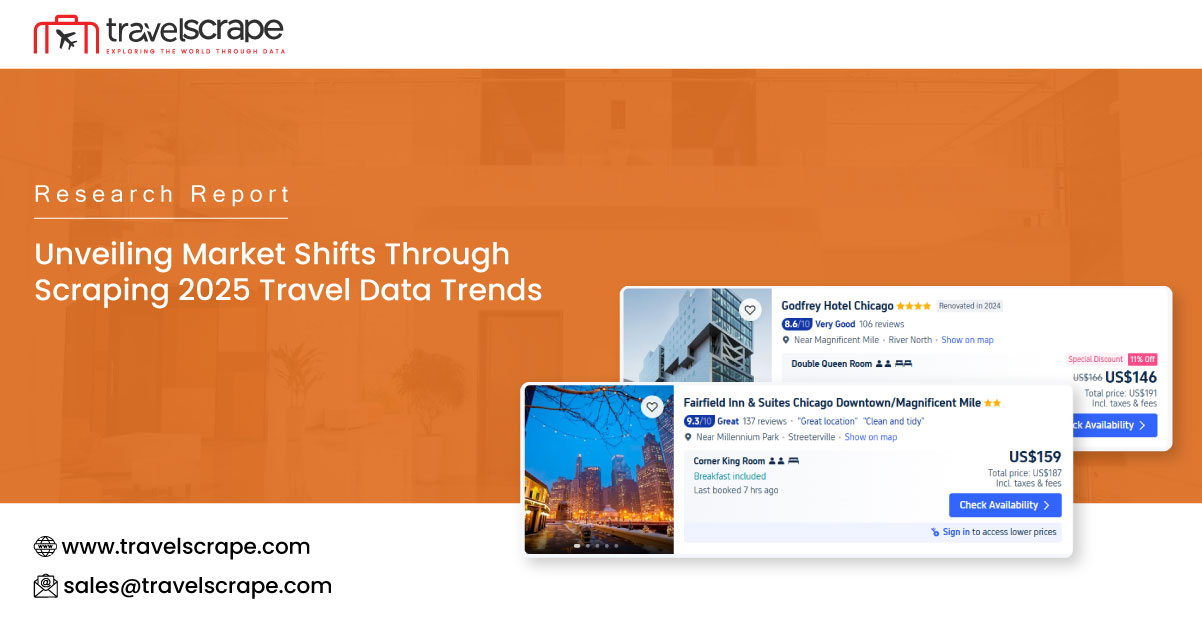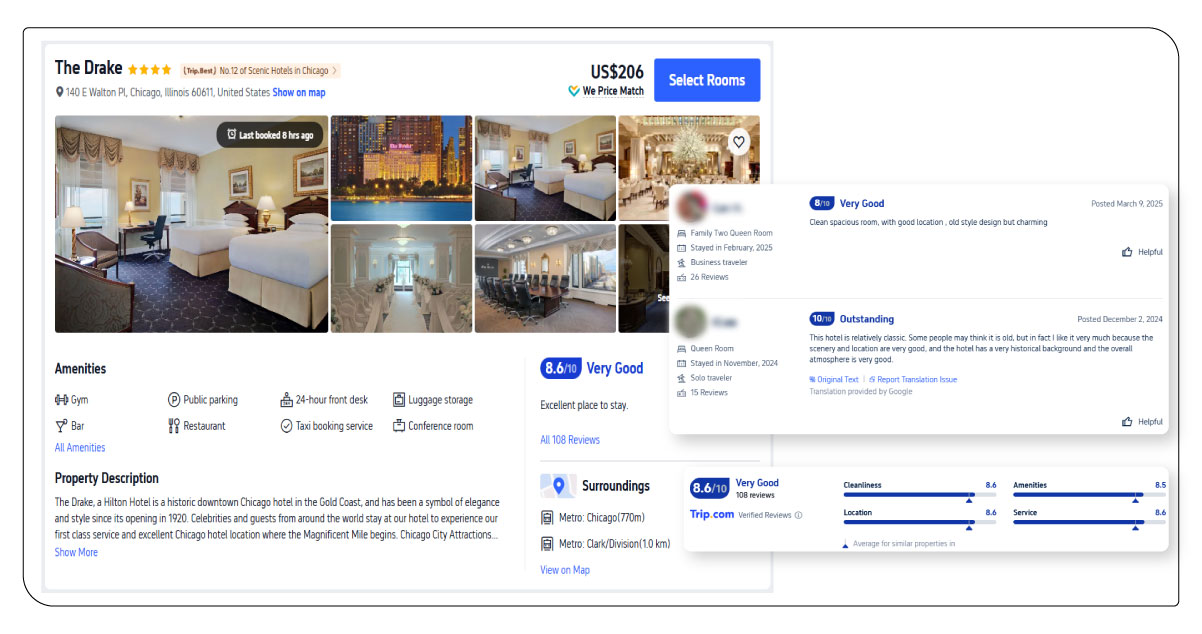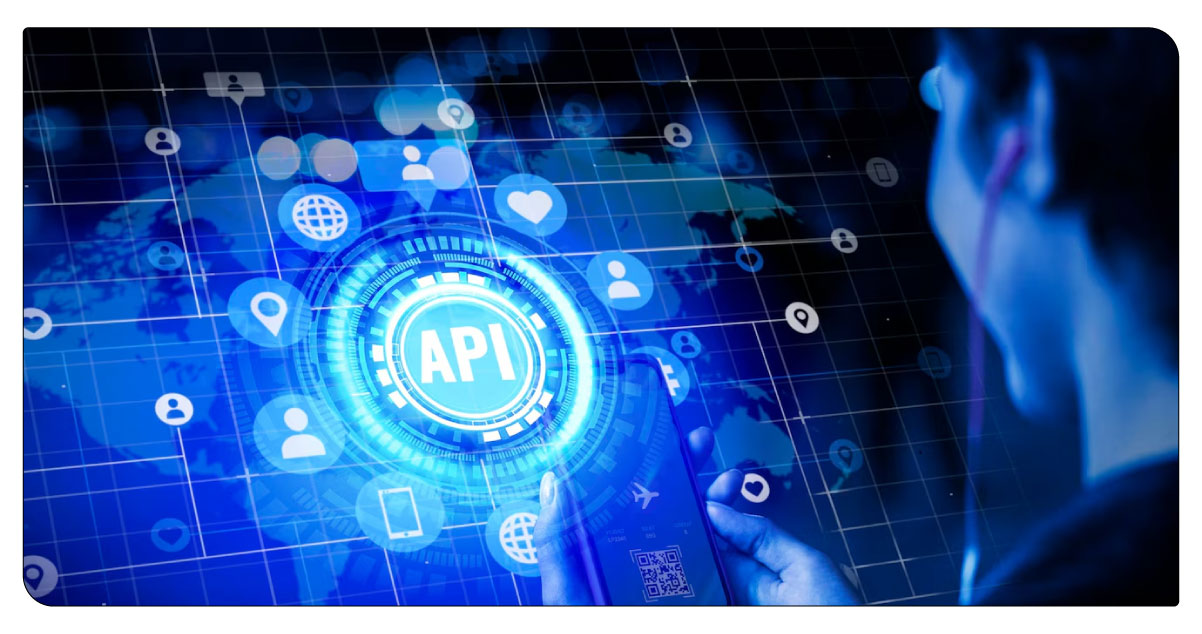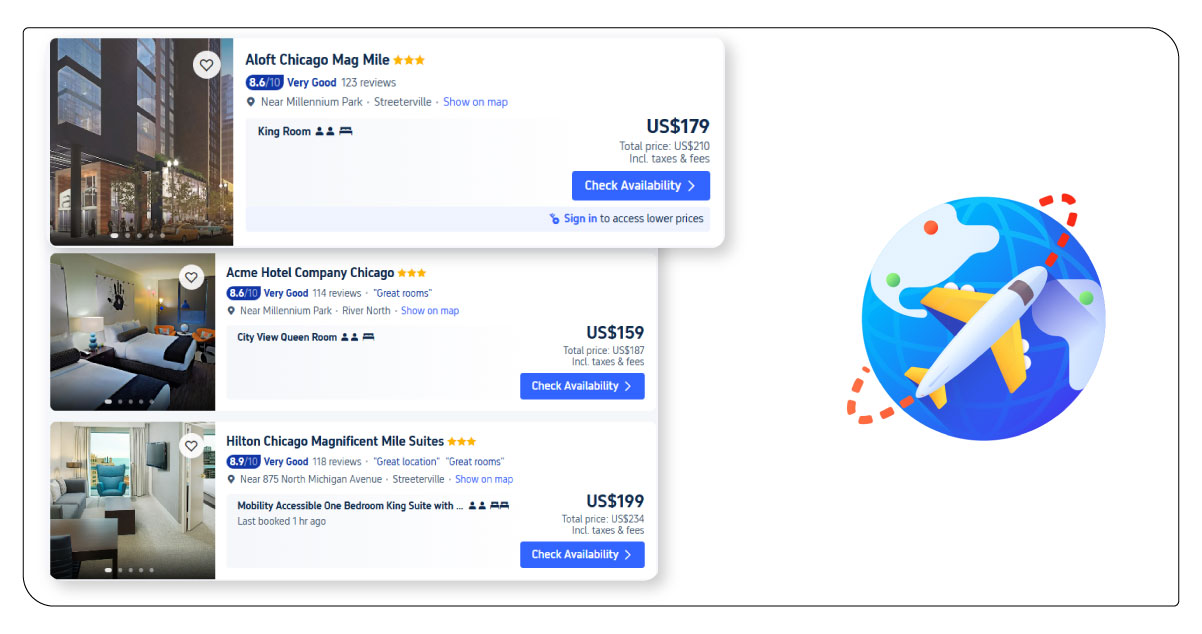Unveiling Market Shifts Through Scraping 2025 Travel Data Trends

Introduction
The travel and tourism industry is set for a technological leap in 2025, driven by data scraping, artificial intelligence (AI), and predictive analytics. As travel resumes full momentum post-pandemic and consumer behavior evolves dynamically, stakeholders are increasingly relying on scraping 2025 travel data trends to stay competitive. Whether it's forecasting demand, tailoring offers, or benchmarking against rivals, timely access to accurate data plays a critical role.
One significant development is the integration of AI in travel pricing , which enables companies to understand micro-movements in pricing and adapt rapidly to changes in demand. As more platforms scrape flight and hotel pricing across online travel agencies (OTAs), metasearch engines, and direct websites, real-time intelligence becomes the cornerstone of strategy. This report delves into how businesses utilize data scraping for competitive intelligence, examines key trends shaping 2025 travel data, and presents quantitative insights and analysis to help travel companies future-proof their operations.
Why Travel Data Scraping Matters in 2025?

The travel ecosystem is becoming hyper-competitive. OTAs, airlines, hotels, car rental companies, and tourism boards are all turning to data scraping as a foundational tool for gaining a strategic advantage. By aggregating pricing, availability, reviews, and occupancy data from public-facing sources, businesses can deploy future of travel data scraping models that drive operational efficiency, consumer targeting, and revenue growth. Among the most disruptive innovations is dynamic pricing in travel, where AI-powered systems adjust rates based on real-time inputs like weather, events, competitor rates, and demand surges. Data scraping enables continuous price monitoring to ensure alignment with market expectations and trends.
Travel Data Trends Shaping 2025
Below is a table summarizing the Top Travel Data Trends in 2025:
Table 1: Key Travel Data Trends in 2025
| Trend Area | Description |
|---|---|
| Predictive Pricing Algorithms | Algorithms that forecast future rates based on historical and live data |
| Instant Price Monitoring | Scraping data to instantly track changes on competitor sites |
| Personalization Engines | AI models leveraging scraped data to tailor travel recommendations |
| AI-driven Inventory Management | Using data to optimize hotel occupancy and flight seat allocation |
| Sustainability Metrics Tracking | Monitoring CO₂ footprints and green ratings in travel options |
| Hybrid Data Models | Combining scraped OTA and internal CRM data for richer insights |
These trends reflect a broader shift toward data-driven travel strategies, where businesses no longer rely solely on internal sources or surveys. Instead, they turn to structured, real-time scraped data to make crucial decisions on pricing, marketing, and customer experience.
OTA & Airline Pricing Analysis
Scraping real-time data from OTAs and airline platforms provides granular visibility into pricing behavior. Companies can now access OTA pricing insights to compare how fares fluctuate across platforms like Expedia, Booking.com, and Skyscanner.
A closer look at scraped data reveals significant disparities in airfare and hotel prices depending on booking windows, geography, and demand forecasts.
Table 2: Average Price Variation in OTA Listings vs Direct Sites (2025 Q1 Sample)
| Booking Window (Days in Advance) | OTA Avg Price (USD) | Airline/Hotel Direct Avg Price (USD) | Price Difference (%) |
|---|---|---|---|
| 0–1 Days | 325 | 295 | 10.2% |
| 3–5 Days | 298 | 275 | 8.3% |
| 7–14 Days | 270 | 260 | 3.7% |
| 30+ Days | 240 | 235 | 2.1% |
From the table above, it’s evident that scraping data allows stakeholders to better understand predictive travel analytics, adjust promotions, and offer better deals ahead of time. Businesses looking to adopt Flight Price Data Intelligence benefit from knowing how competitor pricing shifts across various booking horizons.
Insights from the Scraped Data
- Price Sensitivity Increases as Booking Window Narrows: Travelers are more willing to accept higher prices close to travel dates. This is especially useful when crafting urgent promotions for last-minute bookings.
- OTAs Tend to Inflate Prices: On average, OTA prices are 5–10% higher than direct bookings, especially within a 1–5 day window. This gives airlines and hotel brands a strategic edge when using scraped data to develop rate parity or offer direct-only discounts.
- Review Scores Impact Pricing: Properties with higher ratings command 20% more on average. Scraping Hotel Price & Reviews helps identify which factors (cleanliness, service, location) are driving premium pricing.
Application of AI & APIs in 2025 Travel Scraping

As scraping scales up, companies are investing in AI-powered travel scraping tools that not only collect data but also clean, tag, and derive actionable insights from it. These tools integrate seamlessly with Travel Web Scraping Service providers to ensure 24/7 monitoring and price intelligence.
Many developers now compare travel APIs vs scraping , where APIs are ideal for structured access but often limited by rate caps, access restrictions, or outdated data. On the other hand, scraping provides unrestricted access to publicly visible, real-time data from thousands of sources—ideal for predictive models and competitive benchmarking.
Advanced analytics platforms now embed data from Travel Scraping API solutions, helping teams evaluate patterns such as seasonality, occupancy probability, and conversion-linked pricing strategies. Scraping is not just a tool—but a necessity to keep up with evolving market dynamics.
2025 Forecast: The Rise of Predictive Pricing
Scraped data feeds into Predictive Pricing in 2025, where algorithms can:
- Estimate price elasticity per traveler segment
- Anticipate demand spikes (holidays, festivals, weather disruptions)
- Identify optimal pricing points for different lengths of stay or routes
Such precision unlocks dynamic bundling, flexible cancellations, and automated discounts—creating higher margins with lower manual oversight.
Future of Travel Intelligence

With 2025 poised to be a record year for global tourism, organizations that leverage scraping and AI will emerge as market leaders. The integration of Hotel Data Scraping with AI, real-time insights, and intelligent systems will offer not just a competitive edge—but a new norm.
- AI chatbots offering live booking recommendations based on scraped price fluctuations
- Visualization tools showing city-level pricing heatmaps
- Consolidated dashboards aggregating scraped hotel, airline, and review data in one frame
All these innovations are made possible by continuous access to structured scraping and automated updates via tools that scrape pricing intelligence pipelines.
Conclusion
As we approach 2025, the integration of travel tech 2025 data scraping with AI and analytics defines the future of travel commerce. The ability to collect, process, and act on real-time market intelligence is now critical for survival in a rapidly evolving travel landscape.
Companies equipped with airline and hotel data insights will be able to identify pricing gaps, optimize availability, and improve traveler satisfaction at every touchpoint. Similarly, AI engines fueled by scraped content will allow for AI travel optimization, leading to better inventory turnover and marketing ROI.
With increasing competition, fast-changing consumer expectations, and mounting pricing pressure, real-time pricing travel data stands as the single most valuable resource for strategic travel decisions in 2025 and beyond.
Ready to elevate your travel business with cutting-edge data insights? Get in touch with Travel Scrape today to explore how our end-to-end data solutions can uncover new revenue streams, enhance your offerings, and strengthen your competitive edge in the travel market.